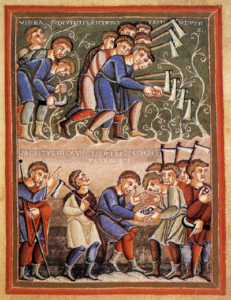16th Sunday after Trinity 2023 St Andrew’s Milngavie
Today we celebrated the 16th Sunday after Trinity. We warmly welcomed Hugh to play for us.
This week we received the sad news that Mary Finalyson has died at the age of 98. Mary was for many years a great friend and member of St Andrew’s.
A service of thanksgiving for her will be held on Wednesday October 11th 10.30 at Cairns Church.
This Week
Tuesday 10am – Prayer Group in the Garden Room
Thursday 10am – Said Holy Communion followed by coffee in Friendship House.
Friday 7pm – Friendship House Management Committee AGM in church – please do support if you can.
Looking ahead…….
Sunday October 8th 10am Sung Eucharist for Harvest festival followed by coffee, cakes and sale of produce etc
Sunday October 22nd AGM in church following Sung Eucharist and coffee.
Readings for next Sunday – 17th Sunday after Trinity – Ezekiel 18:1-4,25-end Philippians 2:1-13 Matthew 21:23-32
 Today’s readings Jonah 3:10-4:11, , Philippians 1:1 -30, Matthew 20:1-16
Today’s readings Jonah 3:10-4:11, , Philippians 1:1 -30, Matthew 20:1-16
“It’s unfair” is a very familiar cry. We’ve probably all said it, but life so often can seem unfair. We are dealt cards we feel we don’t deserve; we must cope with difficult situations which are not of our making. We do our best but still things go wrong.
Equally we know people who, in our opinion, seem neither to earn nor deserve what they get like a job promotion, recognition and worse still, we’ve often seen people receive rewards for jobs, which we may consider, poorly if not badly done.
It was the same in ancient times. In the OT Jonah felt he had been treated very unfairly by God in his dealing with the people of Nineveh.
The point is we tend to view the world, ourselves, and others through the lens of fairness rather than grace, the exact opposite of how God views the world and our lives. But…we’ve been taught from an early age that fairness matters. Watch a bunch of children play and it won’t be long before you hear someone say, “That’s not fair.” It’s not just children, adults also want fairness. Too often, however, fairness rather than love, forgiveness, or generosity is the measure by which we act and judge people and circumstances.
This is what Jesus is saying in the parable this morning. The story is set in a common enough situation – an employer is hiring men. Here in this story the vineyard owner employed men to help him at 4 different times during the 12-hour day, even employing at the 11th hour. The first workers are promised a denarius – a typical day’s wage. But the terms of the subsequent hiring’s however are a bit vague, “whatever is right” is the comment.
When payment time comes at the end of the day, those working longest naturally assume they will be paid the most. So, when they received the same, they were upset and one can understand. It didn’t seem fair. But after all, it was the agreement they made, it was the owner’s money, and his right to pay others in line with his own sense of fairness. But the workers were not pleased that they all got paid the same amount. To them it simply wasn’t fair.
But so often words of unfairness are associated to a situation which we haven’t fully understood. This parable was no imaginary situation. The harvest had to be gathered in towards the end of September before the rains came. The pressure of work meant that any worker was welcome even if they could only give an hour or so.
A denarius was a normal day’s wage, the marketplace was an equivalent of a job centre or employment agency. A man came first thing in the morning and waited till he was hired. The fact that men stood there patiently all day meant that they desperately wanted work, they probably had families to feed. The pay was a denarius a day and if they were unemployed for the day then their children would go hungry at home.
This parable, therefore, shows the compassion and generosity of God. Unemployment can be a very cruel thing as many of us have experienced. So even though it was late in the day the vineyard owner still employed these hopeful workers. He gave them a sense of purpose and worth and money to feed their families.
But still it remained unfair to the other workers who had toiled a much longer day that they got the same pay. But as so often occurs in Jesus’ teaching, he encourages us to be subversive in our thinking and interpretation. He wants us to look at the bigger picture, to think beyond ourselves and our needs, to his kingdom and ultimately to the great mystery of the world to come.
Perhaps this parable then is not so much about work but more about the kingdom. It appears in the context of Jesus giving surprising examples of those who belong to God’s kingdom: for example, children (Matt. 19:14) He is clear that the kingdom does not belong to the rich, illustrated by the parable of the rich young man. (Matt. 19:23-26).
The Kingdom belongs to those who follow Jesus.
“Many who are first will be last, and the last will be first” (Matt. 19:30).
These words first heard in chapter 19 and then repeated in chapter 20 at the end of this parable suggest that the parable is a continuation of the discussion about those to whom the kingdom belongs. Entry into God’s kingdom is not gained by our work or action, but by the generosity of God.
